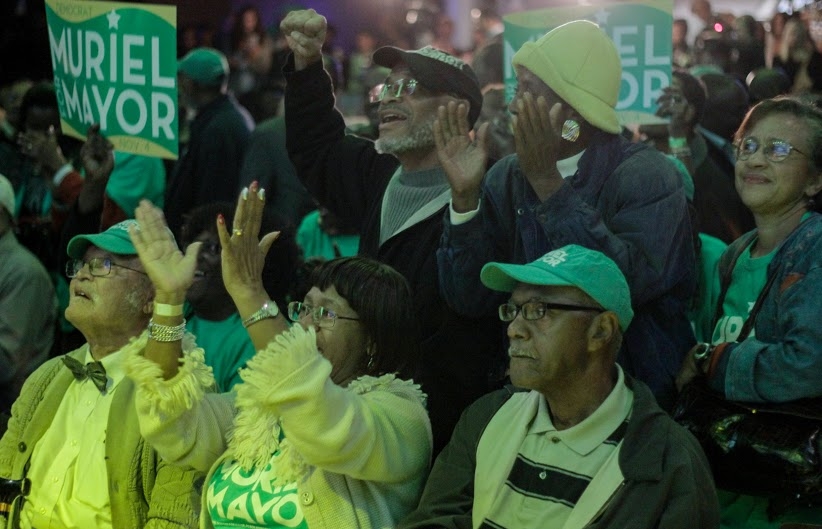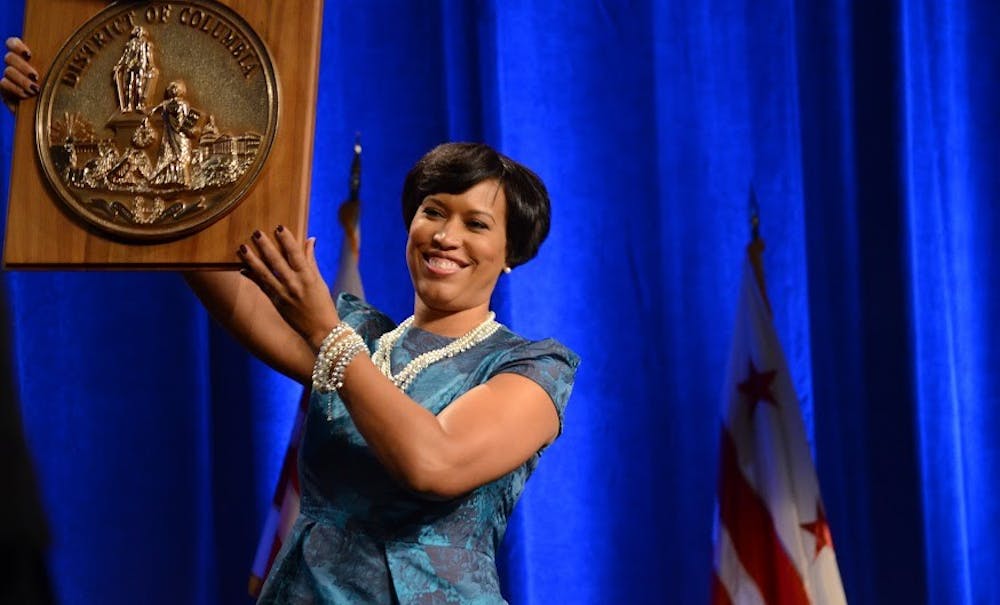AU alumna Muriel E. Bowser (D) became the first woman in 20 years to be sworn in as mayor of Washington, D.C., on Jan. 2 at the Walter E. Washington Convention Center. She inherits a city whose economic boom has left some behind, leaving a dilemma for Bowser: balancing progress while dealing with an urgent homelessness and affordable housing crisis.
“It’s a new day in Washington,” Bowser declared in her inaugural speech to a crowd of a thousand. “A fresh start for all of the families that call D.C. home.”
After taking her oath just before noon, Bowser spoke about the challenges of a near $25 million budget deficit, shrinking borrowing capacity, construction costs, transit projects, creating jobs and alleviating homelessness.
“We will confront our challenges head-on,” she said. “Not tomorrow, but today.”
Bowser also declared her hopes and desires for the city. She wants to design a new path for D.C. statehood and voting rights, begin streetcar service, reform public schools and improve city services such as clearing snow.
“When I look at our city, I see promise, and I see potential,” she said.
Bowser, 42, replaces one-term mayor Vincent C. Gray, who steadily steered the city out of a $440 million deficit but whose tenure was marred from the start by a still-ongoing federal investigation into allegations of campaign corruption. While Gray denied the allegations, his lead in the polls in the run-up to the Democratic primary evaporated. Bowser edged him by 10 percentage points in the April primary.
The general election that ensued, spanning seven months, was trickier for Bowser than past Democrats. Councilmember David A. Catania (I) promised to make it the most competitive one in D.C. history. He leveled sharp attacks on Bowser, labeling her as inexperienced and a part of the Democratic establishment. But on election night on Nov. 4, she won 54 percent of the vote to beat Catania and Carol Schwartz (I), affirming the Democratic party’s dominance in the District.

A "very different" Washington
On the campaign trail, and again in her inaugural address, Bowser frequently reminded audiences and people she met her upbringing: a fifth-generation Washingtonian who grew up in North Michigan Park.
“You know that my folks live in Ward 5, my sister in Ward 8 and two of my brothers in Ward 6 and Ward 7,” she said at her inaugural ceremony. “We are Washington, D.C.”
She left the city to attend Chatham University in Pittsburgh during the 90s, back when the District was nicknamed the murder capital of the U.S. and was far from the economic boomtown it is today.
“I often say I grew up in a time when this was a very dangerous city; we were broke,” she said at a mayoral debate on Oct. 2.
Following college, Bowser lived in Philadelphia for a couple years and worked in the private sector. That’s when she says she realized her true calling was public service, leading her back to her hometown, and to AU.
In 2000 she graduated from the University with a master’s in Public Policy, and four years later she won her first election, becoming an Advisory Neighborhood Commissioner in Ward 4. She served two terms as commissioner.
When then-Ward 4 Councilmember Adrian Fenty (D) won the mayoral election in 2006, he endorsed Bowser to replace him on the Council, and Bowser won handily.
Bowser follows the footsteps of Fenty now—a council member from Ward 4 turned mayor. Her ascent to the mayor’s office in the John A. Wilson Building, where the D.C. Council is also housed, from the lowest echelon of D.C. politics happened within just a decade.
“We’ve come a long way in Washington,” she said in her inaugural speech. “But the challenges that remain are among the toughest.”





